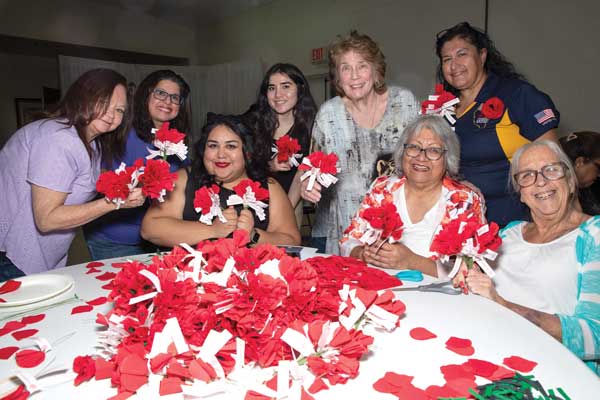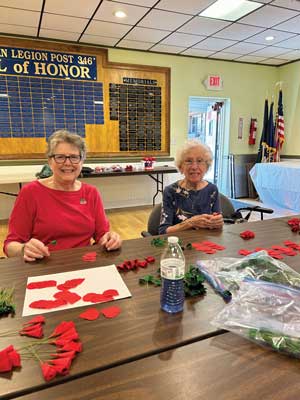
Memorial Day and Veterans Day are two major holidays when the red poppy is distributed at local supermarkets, area hardware stores, in front of American Legion post homes, and more locations throughout the country.
Although this flower is small — it is powerful! The poppy is a symbol to honor the fallen and support the living. The money collected is used to directly support veterans, active-duty servicemembers, and their families.
Distributing poppies in the more than 7,000 local communities where ALA members live is one way to show who we are and what our mission is about.
But all of those poppies — who makes them? For a long time, only military veterans were allowed to make the flowers. But today, many ALA members and American Legion Family members contribute to the cause to ensure there are enough poppies each year for distribution.
ALA departments (states) and local units are holding more poppy making events to meet the demand, as well as teaching more people to make the crepe paper flower that we as an organization distribute year-round. Members gather in groups large and small to carefully put together intricate pieces that make up parts of this handmade flower.
ALA members from the departments of California and New Jersey share with us their poppy making experiences in hopes of encouraging more units and departments to take part.
Gabriella Ramos
Department of California poppy chair
Ramos served as California Unit 261 poppy chair from 2022-2024 before she was asked to be the department poppy chair for the 2024-2025 ALA administrative year.
 “As department chair, I am here to help units and districts promote the Poppy Program and remind them how we use the Poppy Funds to serve our veterans,” she said.
“As department chair, I am here to help units and districts promote the Poppy Program and remind them how we use the Poppy Funds to serve our veterans,” she said.
Being in a room full of ALA members who were eager and excited to make poppies made for a great Sunday afternoon in California. About 50 Auxiliary members made over 1,000 poppies in just a few hours, with 40% being first-time poppy makers.
“I believe the first-timers got a sense of accomplishment and joy in making poppies, knowing they’re doing their part to ensure the remembrance of those who gave their lives for us,” Ramos said.
For many ALA departments, since COVID-19, the number of veterans making poppies has decreased.
“Many Auxiliary members stepped up and began making poppies to ensure our department would have enough poppies,” Ramos said. “Our first party went so well, we planned another. Five districts were present to assist in poppy making.”
A poppy making day like California’s helps to benefit the department with overall poppy distribution needs.
“The significance of the poppy is so important,” Ramos said. “We need the poppies to promote the Poppy Program so all of our heroes who gave their lives will be remembered and given the respect they deserve.”
Ramos said she hopes those who participated in the event left feeling happy and with a sense of pride.
“Poppies are necessary to share the Poppy Program and receive donations for our veterans,” she said. “The donations we receive are essential to the veterans we are serving, from Veterans Affairs & Rehabilitation needs to the mission projects we support such as the National Veterans Creative Arts Festival, Armed Services YMCA food pantry locations, and to support Honor Flights.”
Ramos said departments or units that want to host their own poppy making event in the future shouldn’t be scared to get started.
“It may seem intimidating at first, but it’s possible,” she said. “Create a planning team and iron out all the details. As soon as you have your date, location, and time, make a flyer and start inviting people. Providing a welcoming and positive environment makes it enjoyable. Also, having food and snacks is always a plus.”
The Poppy Program is so important to our overall mission, Ramos said.
“Every time we wear a poppy, we are honoring and paying our respects to those who gave their lives for our freedom,” she said. “I not only think of them, but also their families.”
It is the family ties that have helped give her a personal connection to the poppy.
“Although I never had the chance to meet him, my cousin Sylvia’s son, U.S. Army Sgt. Arthur Mora Jr., gave his all in 2005,” she said. “Wearing the poppy shows my cousin’s family — and especially his children — that he is not forgotten. We remember him, love him, and are forever grateful to him and for him.”
Mary Jane S. Pozarycki
Department of New Jersey Unit 346
Pozarycki became Unit 346 poppy chair in 2017.
“I wasn’t planning on chairing anything to be honest, but it kind of fell in my lap, so I dove in,” she said. “As time has passed, I am honored to chair. It is our biggest fundraiser, and I have met so many veterans and heard so many family stories about veterans who are no longer with us.”
 The current oldest member of the unit, 94-year-old Navy veteran Betty Holmes, told Pozarycki that Unit 346 was making poppies when she joined back in 1962. The current unit members are honored to carry on the tradition.
The current oldest member of the unit, 94-year-old Navy veteran Betty Holmes, told Pozarycki that Unit 346 was making poppies when she joined back in 1962. The current unit members are honored to carry on the tradition.
Unit 346 poppy makers meet every Wednesday at 10 a.m.
“It is very informal,” she said. “We are now a group of seven, but sometimes relatives visit, and they join us for the day. We’ve had people come and go for different reasons. We make poppies until 11:30, clean up, and go to lunch.”
A few of the original Unit 346 members who still help make the poppies are in their 90s. The poppy makers prepare poppies for ALA distribution, as well as for other veteran groups.
“We are all there to help veterans,” Pozarycki said. “We typically make at least 15,000 poppies a year — some years more. Holidays or really bad weather are the only days that keep us home.”
ALA units like 346 are working hard to increase poppy makers, which can be difficult. Sometimes, the distribution side is also a challenge for some units in the country.
The group has experienced a harder time with local businesses allowing for poppy distribution in recent years, which can impact the monies raised for our veterans, military, and their families.
“It is harder these days to find businesses that will let you distribute poppies,” she said. “COVID-19 changed that a lot. Corporations making these decisions changed that a lot. I think one store had what they found out to be a fake charity seeking donations and that put an end to them hosting anyone. Some businesses want liability insurance for four hours. We are lucky to have a large grocery store that allows us eight days up to and including Memorial Day to distribute poppies in their vestibule.”
Each year during the week prior to Memorial Day, members of The American Legion Family volunteer 130 hours at the local grocery store to distribute poppies.
“The customers are very generous, and the employees are very kind,” Pozarycki said. “The unit raises an average of $8,500 that week.”
In addition to physically distributing poppies at the grocery store, they also have poppy donation cans at about 10 local businesses.
“Those donation cans are not as profitable, but if we educate or inform just one person about what the poppy represents, it is worth it,” she said.
Not only is increasing poppy makers and distributing the flower crucial, Pozarycki also understands the importance of educating the community about the American Legion Auxiliary and the poppy. She also works with a local newspaper to prepare an article about the flower and about National Poppy Day each year to assist in that educational component.
“It means a lot to me to be able to help veterans,” Pozarycki said.
In the spirit of Service, Not Self, the mission of the American Legion Auxiliary is to support The American Legion and to honor the sacrifice of those who serve by enhancing the lives of our veterans, military, and their families, both at home and abroad. For God and Country, we advocate for veterans, educate our citizens, mentor youth, and promote patriotism, good citizenship, peace and security.